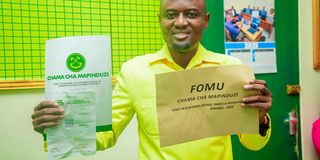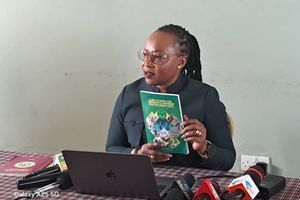
Dar es Salaam. As Tanzania heads towards a heated political season, analysts have urged incumbent CCM Members of Parliament (MPs) to act with strategic caution in order to maintain unity within the ruling party and secure their positions ahead of the October 2025 general election.
Political commentators have observed emerging signs of open tension between some lawmakers and the party leadership, which they say could jeopardise internal harmony and cost sitting MPs not only their party’s nomination but also public trust.
The public fallout between Kisesa MP Luhaga Mpina and President Samia Suluhu Hassan, as well as tensions involving Kawe MP Josephat Gwajima, has sparked debate over the implications such confrontations may have on political careers within CCM.
Speaking to The Citizen, yesterday, a political scientist from the University of Dar es Salaam, Dr Richard Mbunda, cautioned that CCM MPs must avoid open clashes with party leaders, especially at this critical time when the process of nomination within the party has become more competitive and layered.
“After the recent amendments to the CCM constitution, the nomination process involves a broader section of party members. This means anyone seeking a political post must appeal to a wide base—disagreements with party leadership may alienate key supporters in that process,” Dr Mbunda explained.
He noted that the new system, while more inclusive, has inadvertently opened more avenues for lobbying and potential misuse of resources.
“With many people involved in the selection of candidates, there is growing concern that this could lead to increased internal competition, corruption, and vote-buying within the party,” he added. For his part, a political analyst at the State University of Zanzibar (SUZA), Prof Makame Ali Ussi, echoed similar sentiments, stating that internal party discipline will be key for CCM MPs aiming for re-election.
“This is not the time to engage in internal battles. The real contest is with the opposition. Any MP who wants to return to Parliament must be politically intelligent—protect relationships within the party and avoid unnecessary public confrontations,” said Prof Ussi.
He added that internal cohesion was critical to party strength and any MP who appears to challenge the status quo may be viewed as disloyal, which could reduce their chances during both the internal vetting and national elections. Furthermore, a political scientist at the University of Dodoma, Dr Paul Loisulie, stressed that the political landscape within CCM is changing and requires a new level of strategic awareness among incumbents.
“What we are likely to witness is a direct battle between current MPs and those who served in previous parliaments but lost in 2015 or 2020. Many of these former MPs are preparing to make a comeback, and they will use every opportunity to discredit the performance of sitting MPs,” said Dr Loisulie.
According to him, such rivalries could lead to intensified internal competition, possibly creating factionalism within the party.
“It is a political minefield, and only those who understand the dynamics of loyalty, performance, and party structures will survive.” Additionally, a political analyst from the University of Dar es Salaam, Dr Onesmo Kyauke, warned that MPs must avoid providing ammunition to their opponents within and outside the party.
“The moment an MP is seen to be attacking party leadership, especially the Head of State who is also the party chairperson, they lose political capital. This is not only dangerous internally, but it also undermines their appeal to the electorate,” he said.
Dr Kyauke also noted that with growing public scrutiny and access to digital platforms, voters are increasingly watching how leaders behave within party structures.
“Politics today is as much about perception as it is about policy. Voters want unity, not division.”
The analysts agreed that as the internal nomination window already opened, MPs will be navigating two battles simultaneously—one within the party and another with opposition parties.
In such a competitive atmosphere, political missteps, especially those involving high-profile disputes, could prove fatal.
“Unity is strength, especially in political institutions. MPs need to focus on development, loyalty, and their track record instead of turning political survival into public drama,” added Prof Ussi.
He added that the internal nomination process for CCM is expected to intensify in the coming months, with aspirants making their case before large pools of party delegates.


